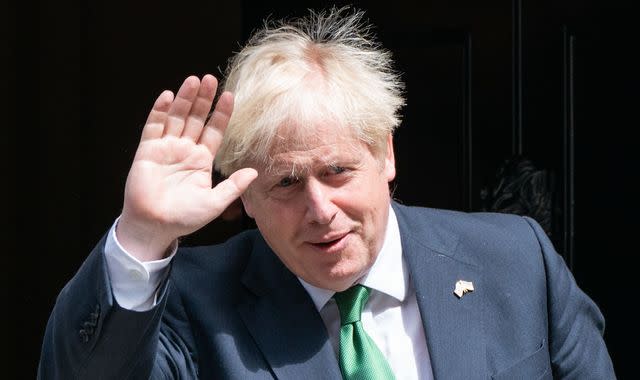Boris Johnson asked to be injected with COVID on live TV, veteran aide claims

Boris Johnson asked to be injected with COVID on live TV and said he would rather "let the bodies pile high" than impose another lockdown in September 2020, according to one of his most veteran aides.
Edward Udny-Lister made the revelations to the COVID inquiry today - telling Lady Hallett the former prime minister's offer to appear on live TV was to "demonstrate to the public that it did not pose a threat", but "was an unfortunate comment when Covid was not seen as being the serious disease it subsequently became".
The bodies comment backs up reports in The Daily Mail and allegations made by Dominic Cummings in 2021.
Mr Johnson denied making the bodies remark on numerous occasions - both on television and in the House of Commons.
Politics latest: Johnson wanted to be injected with COVID on TV
Lord Udny-Lister worked with Mr Johnson when he was mayor of London, as well as when he was the foreign secretary.
He was one of the most senior aides to Mr Johnson in Downing Street - alongside Mr Cummings - and ultimately replaced Mr Cummings as chief of staff.
Lord Udny-Lister's statement to the inquiry said: "In September 2020, the R number was rising. A circuit breaker was proposed in response to this increase and the health secretary was pushing hard for this to take place.
"However, the opposition to any form of lockdown was intense.
"I recall the PM saying in September 2020 that he would rather 'let the bodies pile high' than impose another lockdown.
"Whilst this was an unfortunate turn of phrase, it should be born [sic] in mind that by this point the government was trying to avoid a further lockdown given the already severe impact on the economy and education."
A spokesman for Mr Johnson said the former prime minister would be giving evidence to the inquiry in due course.
Unlike Mr Cummings, Lord Udny-Lister is a long-term ally of Mr Johnson.
His evidence was given on another illuminating day at the official COVID inquiry.
As well as the above claims, Lord Udny-Lister laid out the dysfunctionality of Downing Street - especially in the early days of the pandemic.
The adviser - who had a desk opposite Mr Cummings - said: "Some of the personalities made it very, very toxic... Dominic Cummings's relationship with other people had become very strained."
And messages released to the inquiry revealed that Mark Sedwill - then the head of the civil service - said in July 2020 that "it's hard to ask people to [march] to the sound of gunfire if they're shot in the back".
Simon Case - who is now the head of the civil service - responded by saying: "I've never seen a bunch of people less well-equipped to run a country."
Read more:
Final message between Johnson and Cummings revealed
The moments you may have missed at the inquiry last week
He added that "top-drawer" potential recruits had refused to work in Downing Street because of the "toxic reputation" of the setup.
Lord Udny-Lister also spoke of a distrust or dislike within Downing Street for including devolved administrations within decision-making, as it was felt that that decisions would be briefing or introduced early by Scotland for "political" reasons.
Before the political appointee gave evidence, Simon Ridley - who was head of the COVID-19 taskforce within Number 10 - was before the lawyers.
At one point, he confirmed that the taskforce - which coordinated COVID policy - was "blindsided" by Rishi Sunak's Eat Out to Help Out announcement. He said the decision was instead made by the then chancellor and Mr Johnson.
Click to subscribe to the Sky News Daily wherever you get your podcasts
Another point to come out of Mr Ridley's evidence was an email sent by Alexandra Burns, a Number 10 official, in April 2020. This asked if there was an "overall strategy" for care homes - adding that looking at Europe made it seem like one was necessary as "once someone gets [COVID] in one of these places many die".
A diary extract from Sir Patrick Vallance, the former chief scientific adviser, wrote in his diary in October 2020 that he had a "very bad meeting" in Downing Street, in which Mr Johnson called for a "whisky and a revolver" and Mr Sunak was "using increasingly specific and spurious arguments against closing hospitality".

 Yahoo News
Yahoo News 
